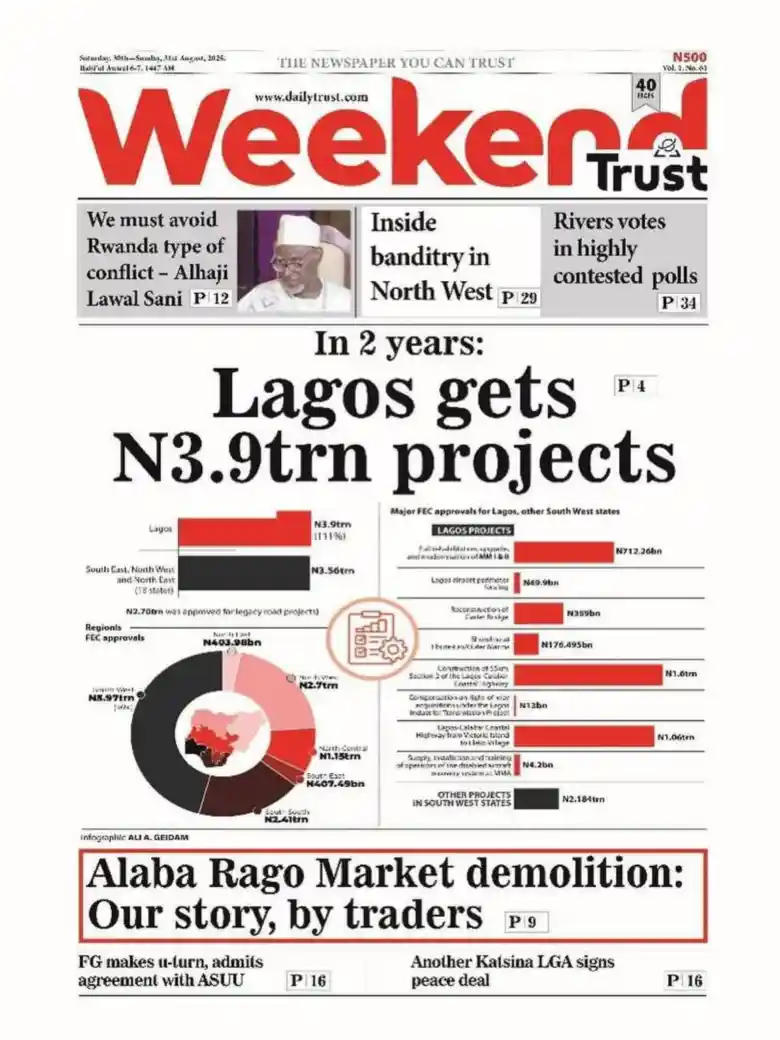Sunday Dare, Special Adviser, Media & Public Communication/Spokesperson to President Bola Tinubu, has faulted reports suggesting that Lagos State is favoured at the expense of Northern Nigeria in the allocation of federal projects.
In a statement, Dare pointed at a headline by Daily Trust which read: “In Two Years, Lagos Gets ₦3.9 Trillion Projects.” He described the report as sensational and misleading. According to him, “Numbers without context are not facts. They are distortions, weaponized to inflame rather than inform. The attempt to portray Lagos as over-pampered while casting the North as neglected is not just misleading, it is lazy journalism. The truth is more complex, more national, and more honest. President Bola Tinubu is not just a statesman, he is a nationalist and a President for all.”
Quoting directly, Dare stressed: “WHY LAGOS. YES LAGOS. (AND ABUJA TOO). THE NORTH IS MOBILIZED. NOT MARGINALIZED.”
He explained that Northern Nigeria has received significant capital allocations in 2024 and 2025, showing that the region is mobilised rather than neglected. Projects listed include the Abuja–Kano Expressway dualization, the ₦12.1 trillion Sokoto–Badagry Superhighway with ₦3.63 trillion already approved for rollout in Sokoto and Kebbi, the Kano–Maradi Railway, and the Zungeru–Kano Power Line. He also mentioned the Funtua and Bauchi Inland Dry Ports and airport upgrades in Katsina, Maiduguri, and Kaduna.
Agricultural and water infrastructure are also part of the investments. These include the Sokoto-Rima, Upper Benue, Hadejia-Jama’are, and Lower Niger River Basins, alongside food-security initiatives like Special Agro-Processing Zones in Borno, Kaduna, and Kebbi, as well as wheat development projects in Jigawa and Kano. Dare said this demonstrates clear mobilisation rather than marginalisation.
On Lagos and Abuja, Dare noted that critics often fail to put numbers in the right context. “What did Lagos receive in 2013–2015? Or 2021–2023? Without period-over-period comparisons, adjusted for inflation, exchange rates, and statutory revenue outturns, any single number is meaningless,” he said.
He explained that Lagos, with over 23 million residents, is not just a state but Africa’s second-largest city economy. With hundreds of thousands migrating annually, every Nigerian ethnicity is represented there, making Lagos a national melting pot. The city faces infrastructure loads that no other state in the federation carries.
Abuja, according to Dare, is on a similar path of growth. He said it is one of Africa’s fastest-growing cities, projected to exceed 7 million people by 2030. As the federal capital, Abuja holds the daily burden of civil service, the diplomatic corps, and an expanding private sector. This makes strategic federal support essential.
“That is why President Bola Ahmed Tinubu has given extra care to both Lagos and Abuja. Not as favoritism, but as strategy. When these two urban giants work, Nigeria breathes easier. When they fail, the whole country suffers,” Dare explained.
He further highlighted that national development plans are continuous. The projects being executed in Lagos and Abuja trace back to previous frameworks such as the Economic Recovery and Growth Plan (2017–2020), the Economic Sustainability Plan during COVID-19 in 2020, and the National Development Plan (2021–2025). The upcoming Renewed Hope Plan (2026–2030) will continue in that direction.
Comparing with international examples, Dare stated that mega-cities demand mega-support. He cited New York City, which received $117.5 billion in federal support in the 2022 fiscal year for housing, health, education, and transport. Johannesburg in South Africa, generating one-third of the country’s GDP, also aligns its budget with federal resources, with its 2025/26 provincial budget topping R172 billion.
“If New York and Johannesburg receive proportional federal support because of their scale, why should Lagos and Abuja be treated differently?” he asked.
He added that responsible journalism requires rigour and context. “We must separate propaganda from journalism. That’s the inescapable duty of media practice.”
Dare concluded by stressing the importance of both cities. “Because Lagos is Nigeria’s economic lifeblood. Because Abuja is its political and diplomatic heartbeat. Because both cities carry the daily weight of the federation—demographically, economically, and symbolically. Investing in Lagos and Abuja is not favoritism. It is statecraft.”
“The real question is not ‘Why Lagos?’ or ‘Why Abuja?’ The real question is: What happens to Nigeria if Lagos and Abuja are ignored?”

